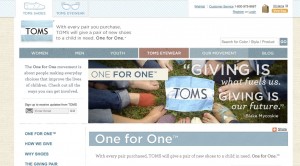By now, we’re all familiar with cause marketing. Why? Because
more and more businesses, whether product or service or
entertainment-focused, are using cause marketing to strengthen their
brand.
Cause marketing happens when brands tie their marketing efforts with support for good causes, such as donating a portion of the purchase price to the local foodbank or annual donations to cancer research. This type of cause marketing has become increasingly popular because it’s being proven more and more effective with the public.
The 2010 Cone Cause Evolution Study found that 83 percent of Americans wish that more businesses supported causes. This remarkable number has doubled since 1993 and businesses are taking note, using cause marketing as a positioning tool to differentiate themselves.
The amazing statistic, I think, is the fact that consumers find cause
marketing more important in a down economy. In this 2010 survey, 19
percent of those surveyed said they would pay more for a product if it
was associated with a cause.
I know this is true for my purchase habits. I am willing to pay more if I know of specific positive impacts beyond my hopes for the item or service. But, beyond the importance for consumers, cause marketing has enormous impacts for the business and its employees.
I discovered early in my career that I would not be satisfied unless I felt that my professional career was contributing toward the betterment of communities. I am naturally drawn toward organizations whose missions reflect this same commitment. For me, as an employee, I would find more satisfaction, more involvement, and more identification with employers who faithfully and genuinely supported a cause. The 2010 Cone survey finds that this is the case for many employees and that dedication to a cause can increase employee involvement and satisfaction.
Companies are being expected to move toward cause marketing and they are finding expected and unexpected rewards. Are there challenges? Of course. For instance, it is becoming clear that the use of social media and other venues for consumers to select a company’s cause isn’t strong cause marketing strategy. Just like brand consistency, cause consistency is important. It’s also becoming clear that having a portion of each purchase or project go toward a cause gives consumers the feeling of involvement and tends to resonate more than an annual company donation.
Cause marketing strategy will undoubtedly continue to develop and grow, which bodes well for our communities as long as companies stay genuine in their efforts to donate to meaningful causes. When Bruce Burtch, a cause marketing leader, was asked his purpose in life, he said “do well by doing good.” Consumers, employees, and companies all benefit from giving back to the community.
Cause marketing happens when brands tie their marketing efforts with support for good causes, such as donating a portion of the purchase price to the local foodbank or annual donations to cancer research. This type of cause marketing has become increasingly popular because it’s being proven more and more effective with the public.
The 2010 Cone Cause Evolution Study found that 83 percent of Americans wish that more businesses supported causes. This remarkable number has doubled since 1993 and businesses are taking note, using cause marketing as a positioning tool to differentiate themselves.
 |
| TOMS shoes donates a pair of shoes to those in need for every pair of shoes purchased. |
I know this is true for my purchase habits. I am willing to pay more if I know of specific positive impacts beyond my hopes for the item or service. But, beyond the importance for consumers, cause marketing has enormous impacts for the business and its employees.
I discovered early in my career that I would not be satisfied unless I felt that my professional career was contributing toward the betterment of communities. I am naturally drawn toward organizations whose missions reflect this same commitment. For me, as an employee, I would find more satisfaction, more involvement, and more identification with employers who faithfully and genuinely supported a cause. The 2010 Cone survey finds that this is the case for many employees and that dedication to a cause can increase employee involvement and satisfaction.
Companies are being expected to move toward cause marketing and they are finding expected and unexpected rewards. Are there challenges? Of course. For instance, it is becoming clear that the use of social media and other venues for consumers to select a company’s cause isn’t strong cause marketing strategy. Just like brand consistency, cause consistency is important. It’s also becoming clear that having a portion of each purchase or project go toward a cause gives consumers the feeling of involvement and tends to resonate more than an annual company donation.
Cause marketing strategy will undoubtedly continue to develop and grow, which bodes well for our communities as long as companies stay genuine in their efforts to donate to meaningful causes. When Bruce Burtch, a cause marketing leader, was asked his purpose in life, he said “do well by doing good.” Consumers, employees, and companies all benefit from giving back to the community.

No comments:
Post a Comment